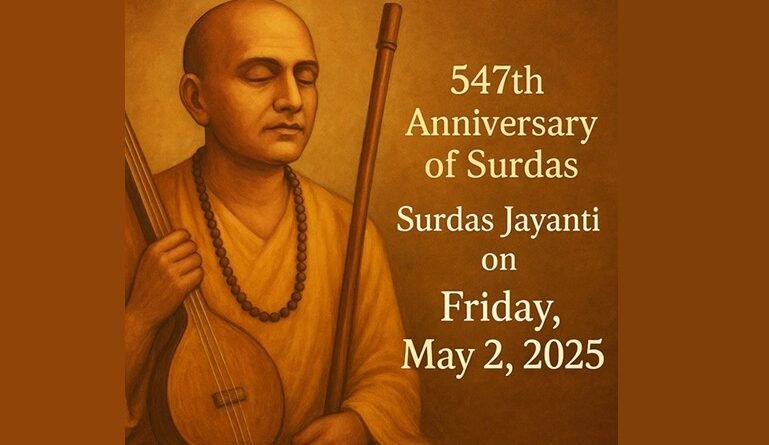Surdas Jayanti Special: Dohas of Surdas
Surdas Jayanti is celebrated to honor the birth anniversary of Sant Surdas, the 15th-century blind poet, philosopher, and devotional singer who holds an unparalleled place in the Bhakti Movement of India. An ardent devotee of Lord Krishna, Surdas’s creations are considered jewels of devotional literature, especially his compositions in Braj Bhasha (a Western Hindi dialect).
Read This: Surdas Jayanti 2025: 547th Birth Anniversary
Surdas is best known for his poetry filled with intense devotion (bhakti), vivid imagery of Lord Krishna’s childhood leelas (divine plays), and his spiritual philosophy. His work, notably the Sursagar (Ocean of Sur’s Songs), inspired countless generations and continues to evoke deep feelings of faith, love, and surrender.
In this Surdas Jayanti special article, let’s explore some of the most beautiful dohas (couplets) written by Surdas, along with their meanings in Hindi, to appreciate the depth and devotion in his words.
Who was Surdas?
Surdas was born in 1478 CE, believed to be in Sihi near Faridabad, Haryana, though some sources place his birthplace in Runkta near Agra. Blind from birth (according to legend), Surdas displayed extraordinary spiritual insight. He became a disciple of the Bhakti saint Shri Vallabhacharya and was closely associated with the Pushtimarg (the Path of Grace).
His poetry predominantly describes the Bhakti (devotion) towards Lord Krishna, especially his childhood days in Gokul, Vrindavan, and Mathura. Through his verses, Surdas conveyed profound spiritual teachings in simple yet emotionally charged language.
Dohas of Surdas
जिन जड़ ते चेतन कियो, रचि गुण तत्व विधान।
चरन चिकुर कर नख दिए, नयन नासिका कान॥
जिस ईश्वर ने सत्व, रज, तम—इन तीन गुणों तथा पृथ्वी, जल, तेज, वायु और आकाश—इन पाँच तत्वों के द्वारा जड़ से चेतन बना दिया और हाथ, पाँव, आँख, नाक, बाल और नाखून दिए (बड़े दु:ख की बात है मनुष्य उसके गुणों का स्मरण नहीं करता)।
देखो करनी कमल की, कीनों जल सों हेत।
प्राण तज्यो प्रेम न तज्यो, सूख्यो सरहिं समेत॥
कमल के इस महान् कार्य को देखो कि उसने जल से प्रेम किया था तो प्राण दे दिए, पर प्रेम को नहीं छोड़ा। यहाँ तक कि पानी के साथ कमल भी सूख गया।
प्रभु पूरन पावन सखा, प्राणनहू को नाथ।
परम दयालु कृपालु प्रभु, जीवन जाके हाथ॥
वह प्रभु परिपूर्ण है, पवित्र मित्र है, प्राणों का स्वामी है। अत्यंत दयालु है और सभी प्राणियों का जीवन उसी के हाथ में है।
दीपक पीर न जानई, पावक परत पतंग।
तनु तो तिहि ज्वाला जरयो, चित न भयो रस भंग॥
पतंगा दिये की लौ पर जलकर भस्म हो जाता है पर दीपक इसकी पीड़ा को नहीं जानता। पतंग का शरीर तो दीपक की ज्वाला में जलकर भस्म हो जाता है पर इसका प्रेम नष्ट नहीं होता।
मीन वियोग न सहि सकै, नीर न पूछै बात।
देखि जु तू ताकी गतिहि, रति न घटै तन जात॥
चाहे पानी मछली की बात भी नहीं पूछता फिर भी मछली तो पानी का वियोग नहीं सह सकती। तुम मछली के प्रेम की निराली गति को देखो कि इसका शरीर चला जाता है तो भी उसका पानी के प्रति प्रेम रत्ती-भर भी कम नहीं होता।
कह जानो कहँवा मुवो, ऐसे कुमति कुमीच।
हरि सों हेत बिसारिके, सुख चाहत है नीच॥
यह मनुष्य जाने कैसा दुष्ट बुद्धि वाला है, और न जाने कहाँ कैसी बुरी मौत मरेगा जो यह भगवान् से प्रेम या भक्ति को छोड़कर भी सुख चाहता है।
सदा सूँघती आपनो, जिय को जीवन प्रान।
सो तू बिसर्यो सहज ही, हरि ईश्वर भगवान्॥
जो ईश्वर सदा अपने साथ रहने वाला है, प्राणों का भी प्राण है, उस प्रभू को तूने अनायास ही बातों ही बातों में भुला दिया है।
सुनि परमित पिय प्रेम की, चातक चितवति पारि।
घन आशा सब दुख सहै, अंत न याँचै वारि॥
प्रिय के प्रेम के या परिणाम की महत्ता को जानकर या सुनकर पपीहा बादल की ओर निरंतर देखता रहता है। उसी मेघ की आशा से सब दु:ख सहता है पर मरते दम तक भी पानी के लिए प्रार्थना नहीं करता। सच्चा प्रेम अपने प्रेमी से कभी कुछ नहीं माँगता या चाहता।
जो पै जिय लज्जा नहीं, कहा कहौं सौ बार।
एकहु अंक न हरि भजे, रे सठ ‘सूर’ गँवार॥
सूरदास जी कहते हैं कि हे गँवार दुष्ट, अगर तुझे अपने दिल में शर्म नहीं है, तो मैं तुझे सौ बार क्या कहूँ क्योंकि तूने तो एक बार भी भगवान् का भजन नहीं किया।
Themes in Surdas’s Dohas
Surdas’s dohas revolve around several central themes:
- Bhakti (Devotion): Loving surrender to Krishna is the core message.
- Viraha (Separation): The intense pain of separation from the divine.
- Bal Krishna Leela (Childhood Tales of Krishna): Innocent yet divine depictions of Krishna’s early life.
- Detachment: Encouraging renunciation of material world for divine love.
- Compassion and Satsang: Highlighting the importance of saintly company and compassion.
Why Surdas’s Dohas are Timeless
- Simple Language: Written in Braj Bhasha, understandable to common people.
- Profound Spiritual Insights: Despite simplicity, the messages are deeply philosophical.
- Emotional Connect: Evokes love, devotion, and sometimes tears of divine longing.
- Musical Beauty: Many compositions were meant to be sung; they resonate musically even today.
Conclusion
Surdas’s dohas are not just poetry; they are spiritual experiences captured in words. On the occasion of Surdas Jayanti, reading, reflecting, and internalizing his dohas can reconnect us with the eternal principles of love, devotion, and surrender. In today’s fast-paced life, his verses gently remind us of the everlasting peace that lies in divine love.
Let us celebrate Surdas Jayanti by immersing ourselves in his soulful dohas and reviving the devotion that connects humanity with the divine.
Happy Surdas Jayanti!

